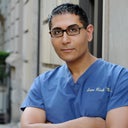Is It Safe to Sneeze or Cough After Rhinoplasty?
I want to have a rhinoplasty, but I sneeze a lot and I have a runny nose (allergies) is it safe to sneeze/cough/blow my nose after rhinoplasty?
I want to have a rhinoplasty, but I sneeze a lot and I have a runny nose (allergies) is it safe to sneeze/cough/blow my nose after rhinoplasty?





What’s trending? Who’s turning heads? Which TikTok myths need busting? We’ve got you. No fluff, no gatekeeping—just real talk. Get our free, unfiltered newsletter.